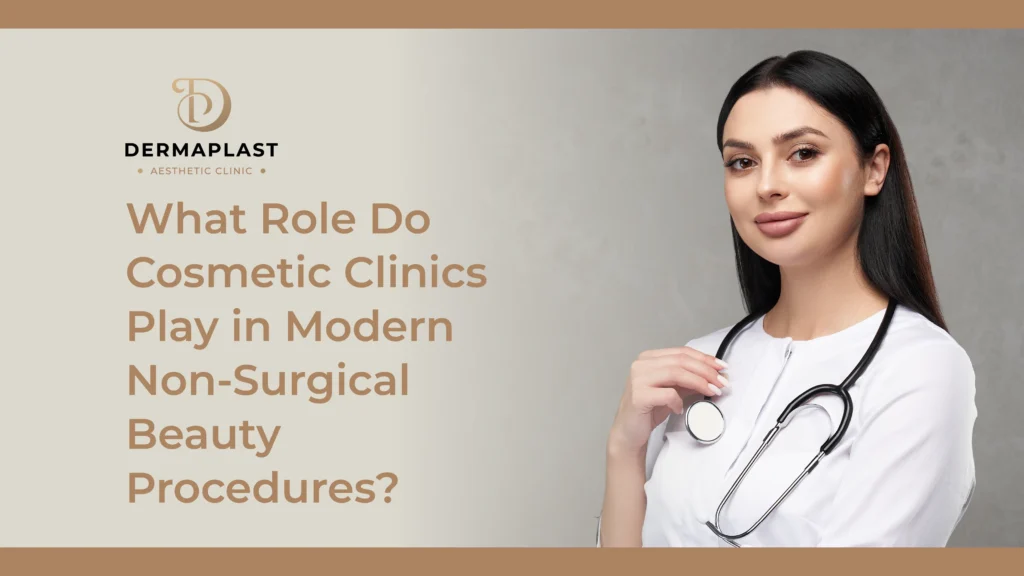The cosmetic clinic industry is experiencing a surge in demand due to the increasing popularity of non-surgical beauty procedures. People are seeking minimally invasive treatments, leading to a rise in the role of cosmetic clinics as providers of these services.
The desire for subtle enhancements and quick recovery times has driven individuals to seek out procedures such as dermal fillers, Botox injections, and laser treatments at these specialized facilities.
Cosmetic clinics are meeting the growing demand for non-surgical beauty procedures by offering a wide range of services that cater to various aesthetic needs. These include treatments targeting skin rejuvenation, wrinkle reduction, facial contouring, and hair removal.
As a result, individuals seeking these services can access them conveniently under one roof without having to undergo traditional surgical interventions.
Advancements in Technology
Technological innovations have played a crucial role in shaping the landscape of cosmetic clinics today. State-of-the-art equipment and advanced techniques allow for safer and more effective non-surgical treatments.
For instance, advancements in laser technology have led to more precise and targeted procedures with minimal downtime for patients.
Moreover, the availability of innovative skincare products and injectables has expanded the treatment options offered by best cosmetic clinic. These developments enable individuals to achieve their desired aesthetic goals with greater ease while minimizing risks associated with invasive surgeries.
Overview of Non-Surgical Procedures
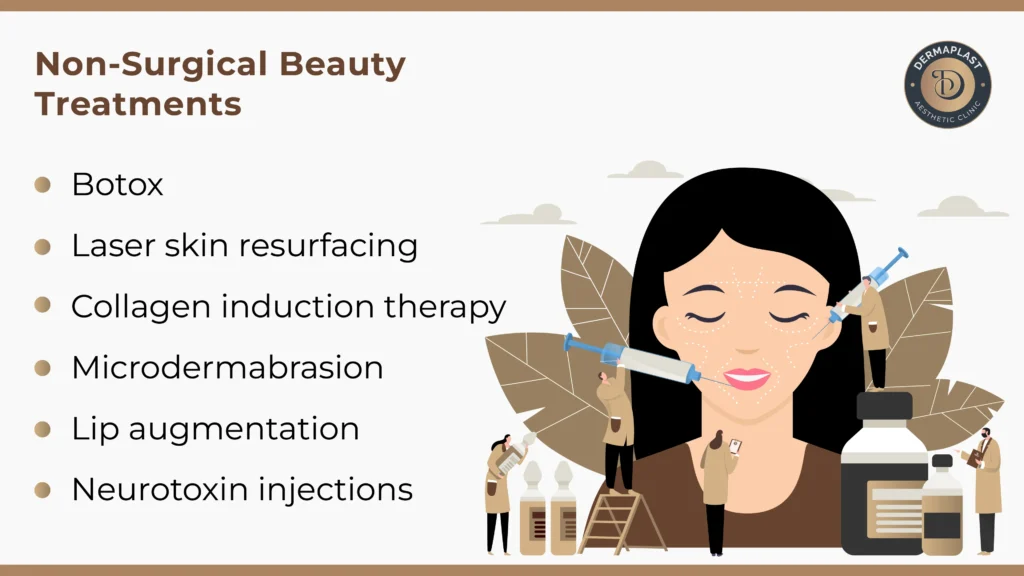
Range of Procedures
Cosmetic clinics offer various non-surgical procedures to enhance one’s appearance without the need for invasive surgeries. These include Botox, injectable fillers, liquid facelifts, and non-surgical rhinoplasty. Botox involves injecting botulinum toxin to reduce the appearance of wrinkles and fine lines.
Injectable fillers are used to add volume, smoothen lines, and enhance facial contours. Liquid facelifts combine different injectables to provide overall facial rejuvenation, while non-surgical rhinoplasty uses dermal fillers to reshape and contour the nose.
Non-surgical procedures have gained popularity due to their ability to address cosmetic concerns with minimal downtime and reduced risks compared to surgical options. Patients often prefer these treatments as they can return to their daily activities shortly after the procedure without extended recovery periods typically associated with surgical interventions.
Benefits Over Surgical Options
One significant benefit of these non-invasive procedures is the shorter recovery times they offer in comparison to traditional surgeries such as aesthetic surgery or maxillofacial surgery.
They generally involve lower risks than invasive surgical techniques like dermatologic surgery. The use of injectables also allows for precise targeting in specific injection areas, providing tailored results that meet individual aesthetic goals.
| Non-Surgical Procedure | Benefits |
|---|---|
| Botox | Reduces fine lines and wrinkles, offering a rejuvenated and youthful appearance. |
| Injectable Fillers | Provides volume and contouring to the face, enhancing facial features with minimal downtime. |
| Liquid Facelifts | Offers a comprehensive facial rejuvenation, combining different injectables for a lifted look. |
| Non-Surgical Rhinoplasty | Reshapes and contours the nose without the need for invasive surgery, with immediate results. |
Advancements in Non-Surgical Treatments
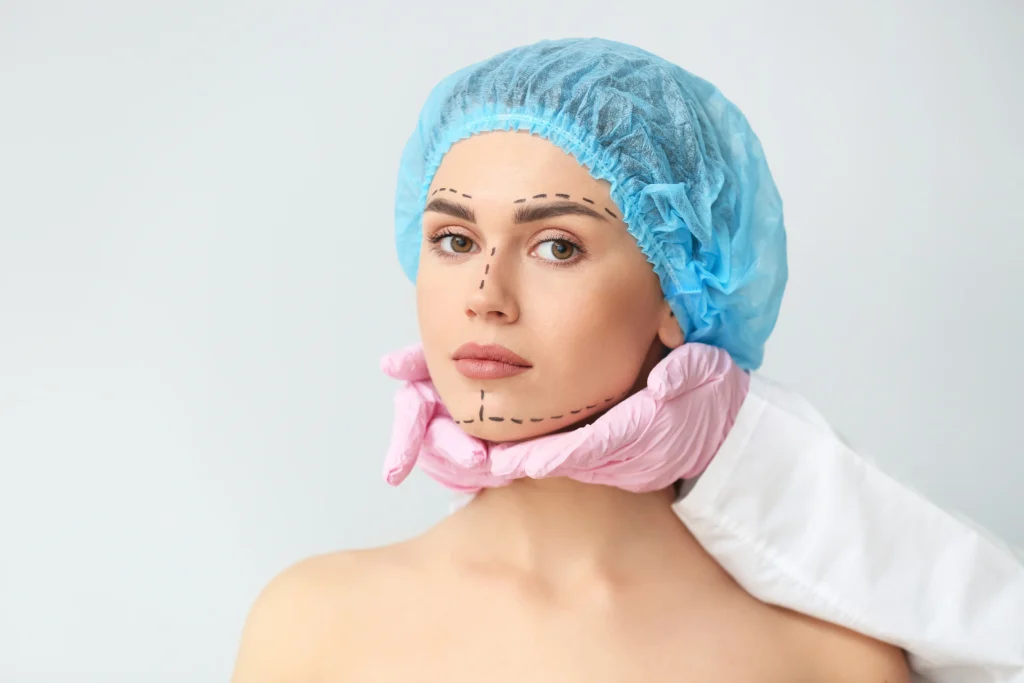
Latest Innovations
Non-surgical cosmetic treatments have seen remarkable advancements with the introduction of innovative technologies and techniques. These developments have significantly improved the effectiveness and safety of procedures such as facial rejuvenation, addressing concerns like facial aging and wrinkles.
New technologies now offer non-invasive alternatives to traditional plastic surgery, providing patients with less risky options for achieving their desired aesthetic goals. For instance, the use of hyaluronic acid fillers has revolutionized the field by offering a safe and effective way to address soft tissue deficiencies without undergoing invasive surgical procedures.
In addition, dermatologic therapy has also evolved, introducing advanced injectable drugs that target specific areas for rejuvenation. These drugs are designed to enhance natural features while minimizing risks commonly associated with more invasive methods. As a result, patients can achieve subtle yet impactful improvements without having to undergo reconstructive surgery.
Enhanced Safety and Effectiveness
The advancements in non-surgical treatments not only improve safety but also increase the overall effectiveness of these procedures. With cutting-edge technologies, medical facilities can provide patients with personalized treatment plans that cater to their unique needs while ensuring optimal results.
Moreover, these innovations have opened up new possibilities for medical students entering the field of cosmetic medicine. They can now learn about state-of-the-art techniques that prioritize patient safety and satisfaction while effectively addressing common concerns related to aging and facial aesthetics.
The Role of Cosmetic Clinics
Non-Surgical Beauty Treatments
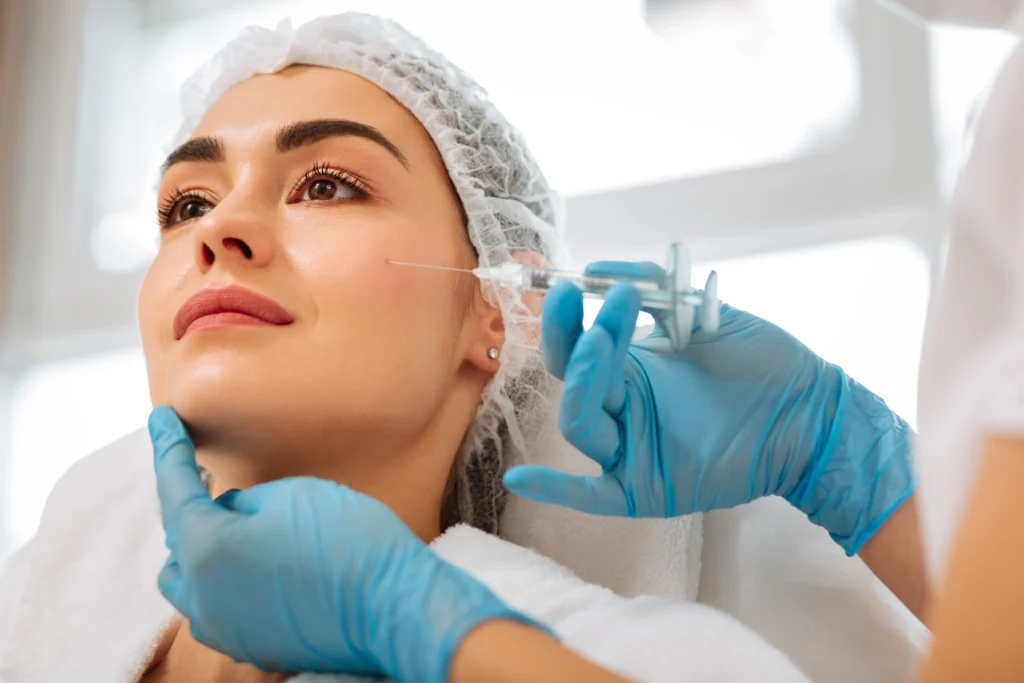
Cosmetic clinics play a critical role in providing cosmetic procedures that do not involve surgery. These treatments can include Botox injections, dermal fillers, laser hair removal, and chemical peels.
By offering these non-surgical options, cosmetic clinics cater to individuals who seek aesthetic enhancements without undergoing invasive surgical procedures.
Cosmetic clinics are equipped with specialized equipment designed for non-surgical beauty treatments. This includes advanced laser machines for hair removal or skin rejuvenation, as well as tools for administering injectables like Botox and dermal fillers.
Moreover, these facilities have trained professionals such as dermatologists and certified aestheticians who specialize in performing these procedures safely and effectively.
Specialized Professionals
The presence of qualified experts within cosmetic practices ensures that individuals receive high-quality care when seeking non-surgical beauty interventions. These professionals possess the necessary expertise to assess each client’s unique needs and recommend suitable treatment plans tailored to their specific concerns.
In addition to this specialized care, cosmetic clinics also conduct thorough skin tests to identify any underlying conditions or allergies before proceeding with any procedure. For instance, prior skin testing helps ensure the safety of individuals undergoing treatments like chemical peels or laser therapies by minimizing the risk of adverse reactions.
Personalized Treatment Plans

Importance of Personalization
Cosmetic clinics understand that each individual has unique body projects and goals. Therefore, personalized treatment plans are crucial in ensuring that patients receive the most effective non-surgical treatments. By tailoring the approach to each patient’s specific needs, clinics can address their concerns more accurately.
Customized treatment plans also take into account factors such as skin type, age, and medical history. This level of personalization ensures that patients receive treatments suitable for their specific conditions and desired outcomes. For example, a person seeking facial rejuvenation may require different procedures compared to someone looking to reduce body fat.
Assessing Individual Patient Needs
To recommend the most suitable non-surgical treatments, cosmetic clinics typically conduct thorough assessments of individual patient needs. This assessment involves consultations with experienced practitioners who evaluate the patient’s concerns and expectations. Through this process, clinics gain insights into what each patient hopes to achieve from their cosmetic procedures.
During these assessments, practitioners may utilize advanced technologies or tools to analyze the skin condition or body structure accurately. For instance, 3D imaging technology allows clinicians to assess facial features comprehensively before recommending appropriate treatments for facial enhancements or corrections.
Safety and Quality Standards
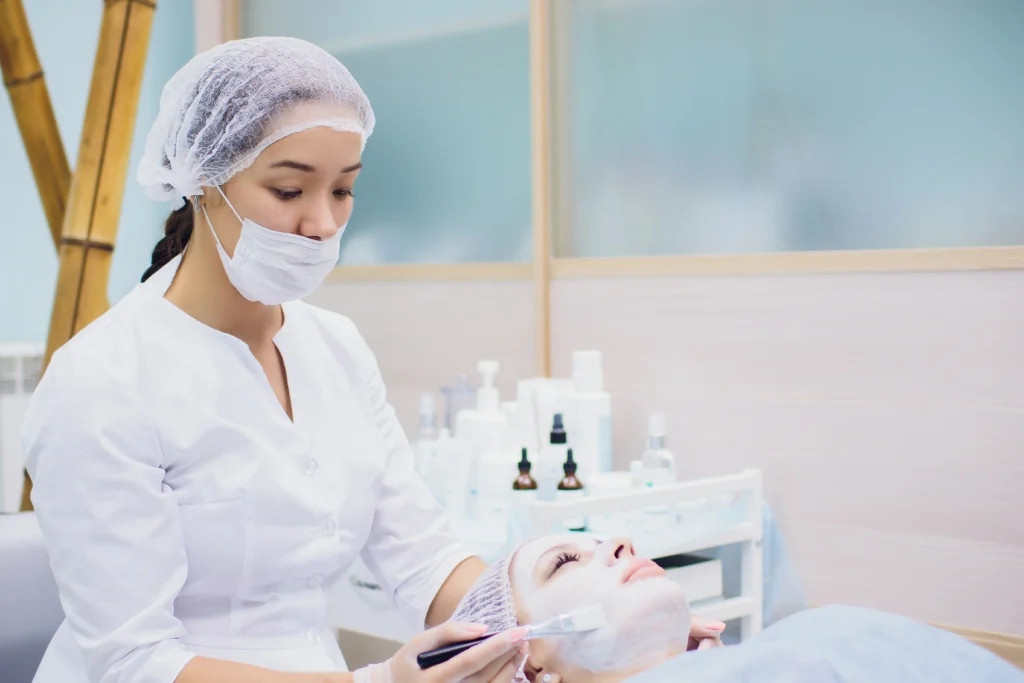
Stringent Measures
Cosmetic clinics that offer non-surgical procedures adhere to stringent safety measures. These include maintaining a sterile environment, using high-quality products, and employing trained professionals. The equipment used for treatments undergoes regular maintenance to ensure optimal functionality.
Reputable clinics prioritize the safety of their clients by following strict protocols for each procedure. They also conduct thorough consultations before any treatment to assess the client’s suitability and address any concerns they may have.
This personalized approach ensures that the recommended treatment aligns with the client’s specific needs and medical history.
Importance of Reputable Clinics
Choosing a reputable cosmetic clinic is crucial for ensuring the highest quality standards and safety. Reputable clinics are often associated with experienced practitioners who possess extensive knowledge in their field. Clients can expect transparency regarding potential risks, expected outcomes, and aftercare instructions when they opt for established clinics.
Moreover, reputable clinics frequently invest in advanced technologies to enhance the precision and effectiveness of their treatments while minimizing risks.
By selecting a well-regarded clinic, individuals can significantly reduce the likelihood of complications or unsatisfactory results post-treatment.
Conclusion
You’ve learned about the remarkable advancements in non-surgical cosmetic treatments and the pivotal role of cosmetic clinics in providing personalized, safe, and high-quality care. With a focus on patient well-being and satisfaction, these clinics are at the forefront of delivering innovative non-invasive procedures tailored to individual needs.
As you consider enhancing your natural beauty or addressing specific concerns, remember that reputable cosmetic clinics prioritize your safety and comfort while offering a diverse range of cutting-edge treatments.
Now that you’re equipped with insights into non-surgical procedures and the essential factors to consider when choosing a cosmetic clinic, take the next step toward achieving your aesthetic goals. Research certified clinics, schedule consultations, and embark on your journey to discover the transformative possibilities of non-surgical cosmetic treatments. Your confidence and satisfaction await!
Frequently Asked Questions
What are non-surgical procedures?
Non-surgical procedures are cosmetic treatments that do not require surgery, such as dermal fillers, Botox injections, and laser hair removal. These procedures offer rejuvenation and enhancement with minimal downtime compared to surgical options.
How have non-surgical treatments advanced?
Advancements in technology have led to innovative non-surgical treatments like laser skin resurfacing, radiofrequency therapy, and ultrasound-based procedures. These advancements provide more effective results with improved safety profiles and reduced discomfort for patients.
What role do cosmetic clinics play in non-surgical treatments?
Cosmetic clinics specialize in offering a wide range of non-invasive aesthetic procedures tailored to individual needs. They provide expert guidance on suitable treatments, ensuring clients achieve their desired outcomes safely and effectively.
How are personalized treatment plans beneficial?
Personalized treatment plans consider each patient’s unique anatomy and goals. By customizing the approach, cosmetic clinics can deliver optimal results while minimizing risks or complications associated with a one-size-fits-all strategy.
What safety and quality standards should I expect from a reputable clinic?
Reputable cosmetic clinics adhere to stringent safety protocols and maintain high-quality standards for equipment, products, and hygiene practices. Look for certifications from recognized medical associations as indicators of a clinic’s commitment to excellence.



